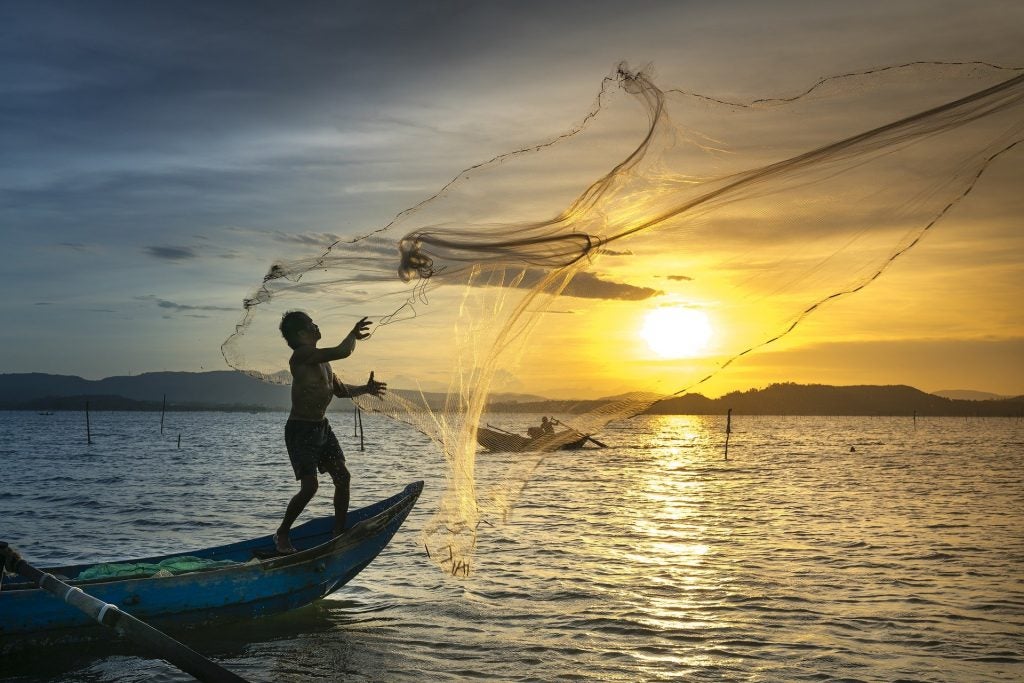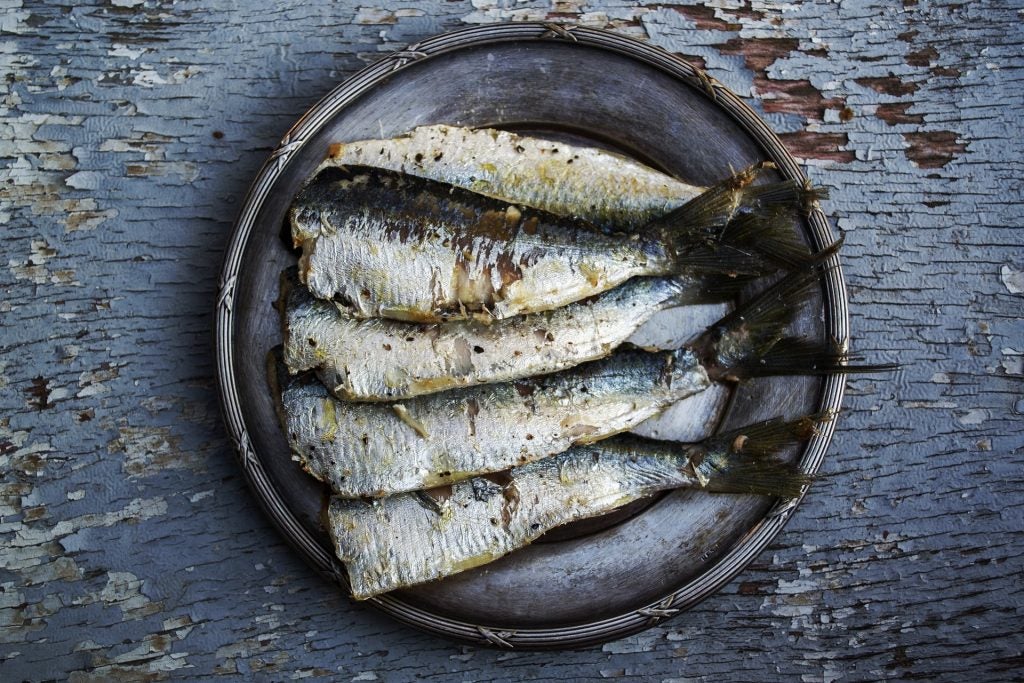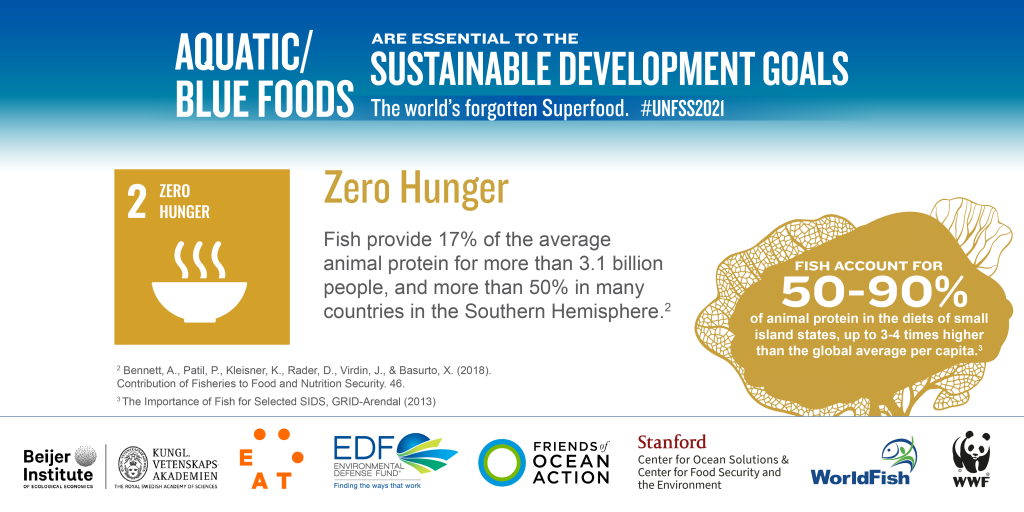 By Jim Leape, Kristian Teleki, Shakuntala Haraksingh Thilsted and Thomas V. Grasso, Co-chairs, Blue Food Cluster for the U.N. Food Systems Summit 2021
By Jim Leape, Kristian Teleki, Shakuntala Haraksingh Thilsted and Thomas V. Grasso, Co-chairs, Blue Food Cluster for the U.N. Food Systems Summit 2021
This op-ed was first published in ECO Magazine’s Autumn 2021 edition. View it here.
Our food systems are fragile and worsened by the COVID-19 pandemic. Conventional food systems, already stretched, have been undermined by outdated supply chains and exposed as vulnerable to climate change. Add to this:
- Global malnutrition is on the rise and hunger continues to plague far too many people.
- Global population is projected to be 10 billion by 2050.
- With just under a decade left to achieve the Sustainable Development Goals (SDGs) by 2030, no country is currently on track to do so.
With these challenges, how do we protect the planet while producing enough food to nourish our growing population? How can we promote nutrition that leads to better health outcomes?
 The answer is closer than we think. Sustainably harvested aquatic foods, or blue foods, provide an opportunity to improve human wellbeing while easing pressure on forests, freshwater resources, and biodiversity. More than 2,500 species of fish, invertebrates, aquatic plants, and algae are captured or cultivated in the ocean, and inland water bodies including rivers, lakes, and wetlands. They play a central role in food and nutrition security for billions of people. They are the cornerstone of livelihoods, economies, and cultures of many coastal and inland water communities. They are often the only source of essential micronutrients and omega-3 fatty acids for vulnerable and poor populations.
The answer is closer than we think. Sustainably harvested aquatic foods, or blue foods, provide an opportunity to improve human wellbeing while easing pressure on forests, freshwater resources, and biodiversity. More than 2,500 species of fish, invertebrates, aquatic plants, and algae are captured or cultivated in the ocean, and inland water bodies including rivers, lakes, and wetlands. They play a central role in food and nutrition security for billions of people. They are the cornerstone of livelihoods, economies, and cultures of many coastal and inland water communities. They are often the only source of essential micronutrients and omega-3 fatty acids for vulnerable and poor populations.
It’s critical that we bring aquatic foods into the heart of food system strategies, governance, and investment. We must recognize the importance of small-scale actors, who account for most of the food production and the majority of livelihoods in the sector. We must ensure a commitment to equity and human rights, knowing that when governments ensure gender equity, they ensure better nutritional outcomes for families and communities. If we begin to think of the ocean and inland water bodies as important sources of food and nutrition, we will be able to advance the SDGs and meet the needs of the growing global population in a nature-positive way.

As the four co-chairs of the Blue Food Cluster for the U.N. Food Systems Summit 2021 (UNFSS), we are championing inclusion of aquatic foods in the outcomes of the UNFSS, whereby bold new actions to deliver progress on all SDGs will be explored. Knowing the promise our ocean and inland water bodies hold, it’s critical that we elevate the importance of aquatic foods and investment in sustainable, climate resilient wild fisheries and aquaculture. Doing so will provide nutrition to hundreds of millions of people and help build environmental stewardship and long-term sustainability of water resources for current and future generations. Realizing these benefits requires system-level change. Governments and communities must embed aquatic foods in food, health, and development policies and foster innovation and entrepreneurship to develop aquatic foods that offer affordable, sustainable nutrition.
UNFSS provides a unique opportunity to launch multisectoral action that elevates the role of aquatic foods in global food and nutrition security. If the UNFSS endorses the potential of aquatic foods to help end malnutrition and build healthy, nature-positive, and resilient food systems, then it will have achieved an important global milestone.
Now is the time for the world to look for innovative solutions for our food systems that can help heal our ocean and inland bodies of water rather than harm them, restore resilience rather than remove it, nurture human health rather than degrade it, and strengthen communities rather than marginalize them.
We have a singular opportunity to reimagine and transform our food systems and recognize the enormous benefits of aquatic foods to nourish all people, nations, and our planet. Let’s act like our lives depend on it because they do.
Leape is the William and Eva Price Senior Fellow in the Stanford Woods Institute for the Environment and serves as co-director of the Center for Ocean Solutions. Teleki is serving as director of the Sustainable Ocean Initiative at World Resources Institute and head of the Friends of Ocean Action for the World Economic Forum. Thilsted is the 2021 World Food Prize Laureate for her influential work on nutrition, fish, and aquatic food systems. Grasso serves as vice president for the Environmental Defence Fund.









